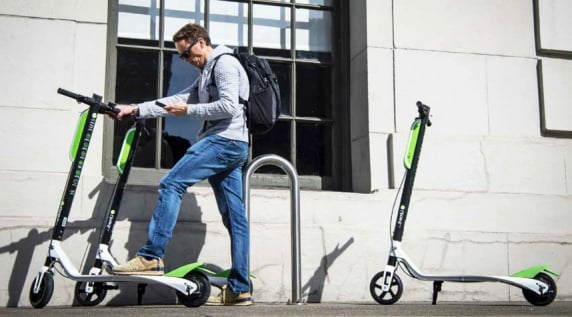COVID-19 and the Escooter Sector: Apocalypse or Opportunity?

In this article, we look at how the pandemic has created new opportunities for escooters – and what the sector must do to leverage them.
It seems like only yesterday that cities around the world were in the midst of a mobility renaissance. From Denver to Berlin, Singapore to Sydney, cities were overhauling legacy public-transit systems, introducing eco-friendly alternatives, and integrating a range of shared and connected mobility options, escooters included.
Micro-mobility landscape before the pandemic
For example, in January, Chicago announced its intention to roll out another scooter pilot program - a program that launched as planned this August. Just a month later, in February, Phoenix became the first US city to install Spin’s charging and parking stations for dockless scooters in the public right-of-way. The company, which was acquired by Ford in 2018, also announced plans to expand into the European market – including Cologne, Paris, and the UK.
This rapid expansion had McKinsey predicting that the US micro-mobility market would reach between $200 and $300 billion by 2030, with similar projections for Europe and China. And there seemed to be no end in sight: “We are looking forward to expanding our services to Europe where cities are committed to making sustainable, safe, and people-centered transportation options work through regulatory frameworks and infrastructure investments,” said Spin’s co-founder and CEO Derrick Ko earlier this year.
But then came COVID-19 and the micro-mobility sector was brought to an abrupt halt.
Escooters were primarily used for short-distance travel, including commuting and last-mile transport between other modes of transportation. When cities implemented lockdown orders and prohibited people from traveling, urban transportation usage plummeted to its lowest level in decades.
With fewer people moving, escooters saw their raison d’être disappear. Usage dropped substantially – by as much as 60% or more in some areas (BCG). Several leading escooter sharing companies, such as Lime, shut down services completely (with the exception of South Korea). Others paused operations in various locations. TIER Mobility, for example, temporarily paused its services in the UAE per governmental guidelines.
Escooters in the New Normal

As many cities begin to ease lockdown restrictions, escooter sharing services face a myriad of challenges. From increased hygiene requirements to long-term work from home protocols, an increase in private car ownership and an ongoing reluctance by the public to use mass transportation, the post-pandemic world doesn’t seem to hold a lot of promise for the escooter sharing sector.
So, is this the escooter apocalypse? Or does the so-called ‘new normal’ represent an opportunity for micro-mobility to redefine its purpose?
All signs point to the latter.
Although COVID-19 may change why people use escooters, the underlying need is still very much there. I would even argue that physical distancing and hygiene – the main factors driving the decrease in use of mass transport and ride sharing – will be what leads users to escooters and other forms of micro-mobility.
Is the change here?
We’re already seeing more people than ever trying scooters for the first time. In North America, Bird says its percentage of first-time riders has more than doubled compared to pre-COVID levels. The company also notes that new user retention rates are up more than 93% - meaning first-time users are quickly becoming repeat riders.
Another interesting trend is that escooter rides are twice as long as they were before the pandemic. Over the past months, Bird reports seeing sustained increases in trip duration of more than 50%, which suggests that users are starting to see escooters for more than just last-mile/short commute options and instead as being a viable means of transportation.
“Initially, we attributed this to a desire to be back outdoors experiencing fresh air and open space,” says Bird’s Chief Product Officer Ryan Fujiu. “But we’re seeing strong indications that it may be a much longer-term trend related to things like public transit concerns, nearly a thousand miles of new open streets, and a spike in the construction of protected cycling infrastructure.”
Redefining mobility for the post-pandemic world

And herein lies the opportunity.
From adding thousands of dedicated bike lanes to establishing docking hubs and charging stations, cities around the world are looking to redefine urban mobility for the post-pandemic world. For example, in response to the COVID-19 pandemic, both London and Milan have started reallocating street space from vehicles to cycling, walking, and public transport - a move that aims to prevent air pollution but that also creates new opportunities for the escooter and micro-mobility markets.
In fact, according to a report by Allianz Partners, these initiatives will ultimately have a net positive impact on the use of new modes of micro-mobility. “Cities are seeing bicycles, electric bicycles, eskateboards, and escooters as a solution for getting people from A to B in ways that avoid using potentially risky public transport,” says Ray Hammond, a futurologist for Allianz Partners. “As many micro-mobility solutions are also sustainable, they offer the added bonus of being able to help cities achieve greenhouse gas emission and air quality targets.”
Clearly, there is a unique opportunity for service providers to partner with cities and other stakeholders to ensure a safe, sustainable, and fully-integrated roll-out of escooters. Several companies are already doing this. TIER Mobility, for example, launched Commute with Tier. The initiative allows holders of public transport subscriptions who commute to work and want to avoid crowds to receive 40 free unlocks.
Apocalypse, challenge, or opportunity?
“We strive to make cities better and we want to do our part in helping society get back to a more normal life,” says TIER Mobility’s co-founder and CEO Lawrence Leuschner. “We know that many people prefer to travel by themselves right now, which is where we can perfectly help with our service.”
Likewise, Lime, together with Allianz, is rolling out a comprehensive insurance program that automatically provides Lime riders with personal accident and liability insurance at no extra cost. “Keeping our riders and communities safe is at the forefront of Lime’s mission,” says Lime CEO Wayne Ting. “With this partnership, riders can step onto a Lime escooter and ride worry-free knowing that they are fully protected.”
It is clear that the post-pandemic world is full of potential for the escooter sharing sector. However, to leverage these opportunities, the sector cannot ignore its pre-pandemic missteps.
Although it may seem like ages ago now, it wasn’t that long ago that escooters were seen as the scourge of urban mobility. From safety concerns to riders zipping through intersections and people and citizens being annoyed at having to step over discarded scooters left on sidewalks - or even thrown into canals - for many, the escooter sharing era got off to a rough start.
Another problem was that escooter services launched in cities without any prior consultation with city planners. As a result, these services were being banned nearly as fast as they were being launched, including in such cities as Singapore and Chicago and such countries as France and the UK.
However, if escooter sharing services learn from these pre-pandemic mistakes and actively address them in the post-pandemic world, then there should be nothing but smooth riding into the future.








